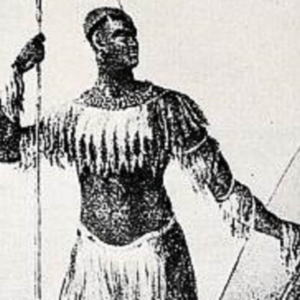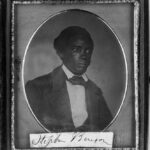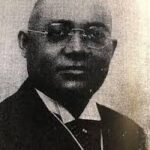SHAKA ZULU
- 5 Min Read
Shaka, (circa 1787-September 12, 1828) was the founder of the Zulu nation and a social and military innovator. The exact date of his birth is shrouded in the labyrinths of oral accounts. This colossus of Zulu annals, who molded disparate units of Nguni peoples into one militaristic Zulu nation within the span of 12 years (1816-28), would have been 41 years old when he was assassinated.

PHOTO CAPTION: Shaka Zulu SOURCE: EA Library. Sketch by:Lt. James King
By all accounts Shaka had a charismatic personality. Whether viewed as a hero or villain, he had overreaching ambitions and was a taskmaster. Implicated in the conspiracy to assassinate him were his half-brothers, close aides and his aunt, Mnkabayi, who was a formidable power-broker and king-maker in those tumultuous times. His father, Senzangakhona, ruled over a small principality and was descended from the ancestor Zulu, son of Malandela.
Two powerful monarchs who dominated the area between the Drakensburg Mountains and Indian Ocean at the beginning of the nineteenth century, Dingiswayo and Zwide ruled over the Mthethwa and the Ndwandwe people. The Zulu of Senzangakhona were clients to the Mthethwa of Dingiswayo, rivals with the Ndwandwe of Zwide for regional hegemony.
Shaka’s mother was Nandi. Her praises and commentary on them indicate she was assertive and had an acerbic tongue. Her marriage to Senzangakhona was not stable. Ultimately Nandi was expelled by Senzangakhona. She took Shaka with her. Even in his youth Shaka may have possessed unusual character traits. These, rather than the stigma of illegitimacy, may explain the problems of his early life. There is conjecture that Shaka became disturbed while living with the Langani people following exile at the hands of Senzangakhona. As a fatherless child, Shaka may have been the butt of vicious bullying which made of him both a fearless fighter and, possibly, a disturbed young man.
When Shaka’s father died in 1816, Shaka was in exile at the court of Dingiswayo. His star was rising. Already he was regarded as a military genius, a political organiser and something of a visionary of whom great things were expected. With the help of a few of Dingiswayo’s regiments he wrestled his father’s inheritance from rival pretenders to the chieftaincy and put them out of the way. Not long afterwards his mentor Dingiswayo was captured and killed by Zwide before Shaka could intervene. Shaka then mounted an assault on Zwide’s power and triumphed to become the supreme ruler of an expanding empire. His ruthless tactics were, in time, to earn him enemies and lead to his own demise in 1828.
The Zulu military system, based on Dingiswayo’s regimental system, was Shaka’s achievement. Shaka’s contribution was to establish for the first time a standing army consisting of regiments into which the men of subjected peoples were drafted according to age sets. This system cut across ethnic affiliations and so contributed greatly to the unity of the Zulu nation. Shaka insisted upon the highest standards of bravery, endurance and discipline, to which he himself measured up. He never married. The Zulu “aristocracy” of today is descended from his half-brother, Mpande, who had many wives and children.
His field tactics included the “chest” and “horns” methods of attach and close hand-to-hand fighting. He replaced the throwing spear by the short stabbing assegai. The warrior was obligated to return from battle with his assegai on pain of death.
By 1820, Shaka had made himself master of Zululand; but, by 1823, massive demographic dislocations had taken place in Natal and neighboring lands. The depredations that followed are known in history as the Mfecane (in Zulu/Xhosa and Difaqane (in Sotho). Out of the chaos Moshoeshoe gathered together the fragmented peoples to found the Sotho nation. Further north in Zimbabwe. Mzilikazi founded the Ndebele nation.
The advent in 1824 of the first English traders on the borders of the Zulu empire was pregnant with enormous possibilities. Although Shaka regarded the event as of little importance, his legendary deathbed prophecy that Europeans would come to rule his kingdom was right. By the end of the century the British traders had been followed by the Boers of Dutch descent in 1837; and Britain annexed Zululand in 1879-88. The entire social, political and economic structure of the area would change drastically well beyond Shaka’s visions of empire.
Shaka’s empire might be said to have suffered from its success. Based on a huge standing military, the army was forced to move progressively farther afield as it conquered and ingested all peoples within its range. With little to do, desirous of settling down to family life, and kept off-balance by Shaka’s internal violence, the Zulu military became progressively unsettled.
Shaka’s mother, Nandi, to whom he was greatly attached died in 1827. The event, according to Fynn, was accompanied by massive hysteria and massacres ordered by Shaka to commemorate her passing. Shaka also imposed prohibitions on sexual activity and cultivation at this time. Shaka’s half brothers, Dingani and Mhlangana, took advantage of the army’s absence and murdered Shaka in September 1828. This action met with a favorable response from a people exhausted by the brilliant but greatly violent and capricious rule of Shaka.
Shaka’s demise, while coming at a relatively young age, occurred only in the wake of truly revolutionary changes on the face of southern Africa. He was directly responsible for the formation of the then largest state in southern Africa, and indirectly responsible for the formation of a number of others. His innovations. Both in militarism and social organization, were strikingly successful, and were used as models by others, including those that he vanquished. The power of his achievements remain a great source of pride to his descendants today, and his presence and achievements are unquestionably lodged in world-historical memory.
Wandile F. Kuse





